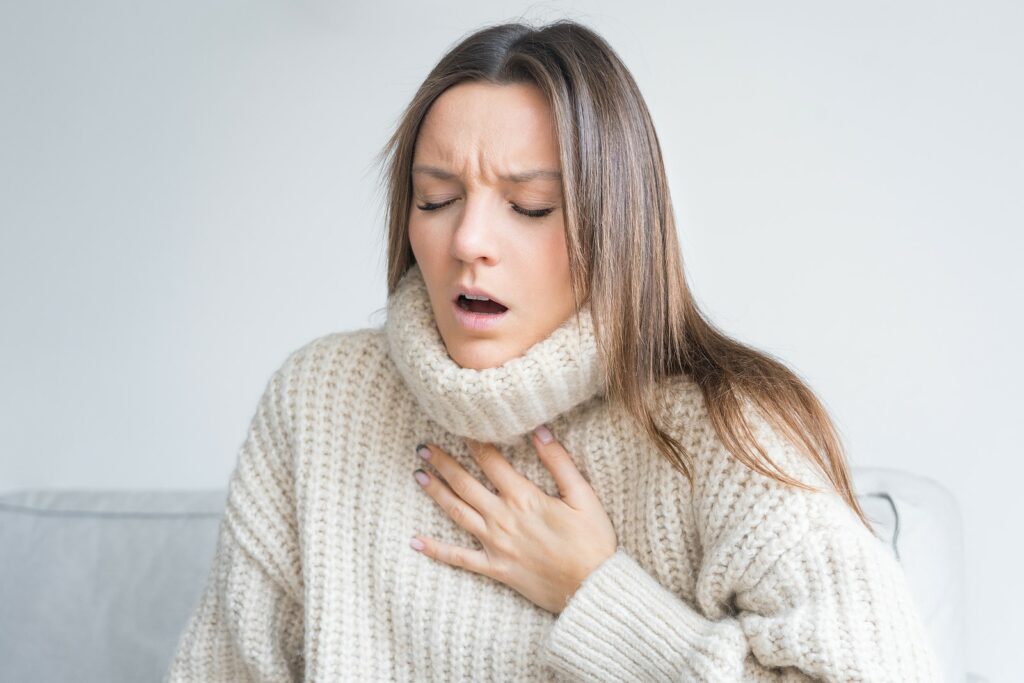
Shortness of breath, also known as dyspnea, is a common symptom that can be caused by a variety of conditions ranging from mild to severe. It refers to the sensation of not being able to breathe adequately or comfortably.
While it can occur as a normal response to physical exertion, shortness of breath can also be a sign of a more serious underlying medical issue. Especially if it happens suddenly or is experienced alongside other symptoms.
Shortness of Breath Causes
- Respiratory Conditions: Asthma, chronic obstructive pulmonary disease (COPD), pneumonia, pulmonary embolism, and bronchitis are common lung-related causes of shortness of breath.
- Cardiovascular Issues: Heart conditions such as congestive heart failure, heart attack, or cardiomyopathy can lead to difficulty breathing.
- Anemia: A lower than normal count of red blood cells can cause feelings of breathlessness.
- Anxiety and Panic Disorders: Anxiety and panic attacks can manifest with rapid, shallow breathing or a feeling of being unable to take a deep breath.
- Allergic Reactions: Severe allergies can lead to anaphylaxis, a life-threatening reaction that includes shortness of breath.
- Obesity: Excess weight can strain the respiratory system, making it harder to breathe, especially during physical exertion.
- Physical Exertion and High Altitude: Normal physical activities in high-altitude areas or intense exercise can cause shortness of breath, particularly in individuals not accustomed to these conditions.
- Infections: Respiratory infections, including COVID-19, can cause significant breathing difficulties.
- Pulmonary Hypertension: High blood pressure in the arteries to your lungs can lead to shortness of breath.
- Sleep Apnea: Interruptions in breathing during sleep can result in waking up feeling short of breath.
Symptom Analysis and Identification
When assessing shortness of breath, it’s important to consider the accompanying symptoms and situations to help identify the underlying cause. Key factors to consider include:
- Onset: Sudden shortness of breath can be more concerning than gradual onset and may suggest a serious condition like a pulmonary embolism or heart attack.
- Duration: Persistent or worsening breathlessness over time could indicate a chronic condition like COPD or asthma.
- Intensity: The severity of the breathlessness and whether it’s affecting daily activities or sleep can provide clues about the seriousness of the condition.
- Triggering Factors: Identifying what triggers the shortness of breath, such as physical activity, allergens, or specific environments, can help pinpoint the cause.
- Associated Symptoms:
-
- Chest Pain or Discomfort: Could indicate a cardiac issue like a heart attack.
- Fever and Cough: Common in respiratory infections like pneumonia.
- Wheezing: Often associated with asthma or COPD.
- Swelling in the Legs: Can suggest heart failure.
- Palpitations: May indicate a heart rhythm problem or anxiety.
- Blue Tint to Lips or Fingernails (Cyanosis): Indicates low oxygen levels.
- Existing Health Conditions: Pre-existing conditions like heart disease, lung disorders, or anxiety can be related to dyspnea.
- Lifestyle Factors: Smoking history, recent travel, occupational hazards, and overall fitness levels can contribute to or cause shortness of breath.
- Rapid, Shallow Breathing: Common in cases of anxiety or panic attacks.
Shortness of Breath Diagnosis and Treatment
Shortness of breath warrants careful evaluation and timely intervention. Elitecare Emergency Hospital ensures that your symptoms are properly looked after.
- Medical History and Physical Examination: Initial evaluation involves a detailed medical history and a physical exam, focusing on the cardiovascular and respiratory systems.
- Pulmonary Function Tests: These tests measure how well the lungs are working, including how much air the lungs can hold and how quickly air can be moved in and out.
- Blood Tests: Blood tests, including arterial blood gas analysis, can assess oxygen and carbon dioxide levels and check for signs of infection, anemia, or other related conditions.
- Chest X-ray or CT Scan: Imaging tests help visualize the lungs and heart, aiding in the diagnosis of conditions like pneumonia, lung cancer, or heart failure.
- Electrocardiogram (ECG or EKG): This test records the electrical activity of the heart and can help diagnose heart problems that may cause shortness of breath.
- Pulse Oximetry: A non-invasive test to measure oxygen saturation in the blood.
- Spirometry: This measures airflow and can be important in diagnosing conditions like asthma and COPD.
- Medications: Depending on the cause, treatment may include bronchodilators for asthma, antibiotics for infections, diuretics for heart failure, or other specific medications.
- Oxygen Therapy: For patients with low blood oxygen levels, supplemental oxygen might be necessary.
- Lifestyle Changes: Quitting smoking, managing weight, and regular exercise can be helpful, especially for conditions like COPD and asthma.
Frequently Asked Questions
Q: What should I do if I suddenly experience shortness of breath?
A: If you experience a sudden onset of shortness of breath, especially if it’s severe or accompanied by chest pain, dizziness, or confusion, seek emergency medical care immediately.
Q: Can shortness of breath be a sign of something serious?
A: Yes, while shortness of breath can occur due to less serious conditions like anxiety or mild respiratory infections, it can also be a symptom of more severe health issues such as heart disease, lung diseases, or blood clots.
Q: Is shortness of breath always related to the lungs or heart?
A: While the lungs and heart are common sources of shortness of breath, it can also be caused by other factors, including anemia (low red blood cell count), high altitudes, extreme temperatures, obesity, and even certain medications.
Get the Care You Need
If you’re experiencing shortness of breath, it’s important to get the appropriate care as soon as possible. At Elitecare Emergency Hospital, we are equipped to diagnose and treat the underlying causes of your breathing difficulties 24/7.














